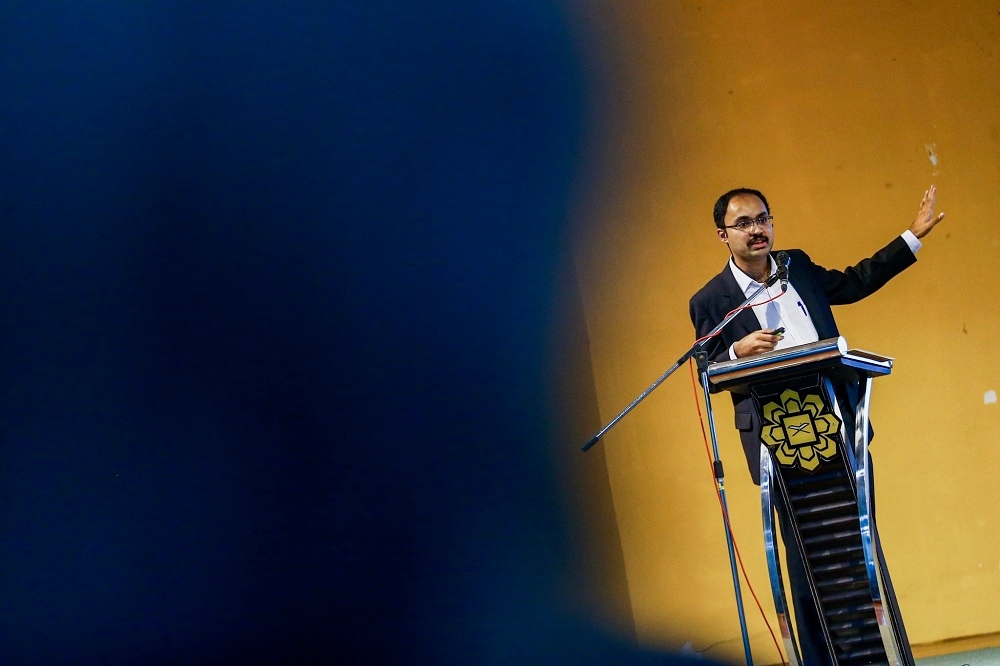
Postal votes: Electoral watchdogs call for extended campaign, hybrid voting to boost access for Malaysians abroad

Volunteers sorting out postal votes according to their constituencies in conjunction with the polling day for the 15th general election in this file picture dated November 18, 2022. — Picture by Firdaus Latif
Saturday, 25 Jan 2025 7:00 AM MYT
KUALA LUMPUR, Jan 25 — Electoral watchdogs have called for reforms to make overseas voting more accessible, highlighting the need to extend campaign periods and streamline processes for Malaysians living abroad.
Speaking to Malay Mail, Tindak Malaysia director Danesh Prakash Chacko proposed declaring overseas Malaysians eligible for postal voting three to six months in advance to reduce logistical hurdles.
“There should be an increase in the campaign period to no less than 21 days (no legislative change required), expansion of classes for witnesses to include authorised Malaysian representatives abroad (legislation change required), and a trial of eVoting for Malaysians abroad,” Danesh said.
Danesh outlined flaws in the current postal voting system:
Eligibility confusion: Overseas Malaysians are split into two groups. While military personnel, civil servants, and students automatically qualify for postal voting, their spouses do not. Others must wait for gazetted EC notices, which are often issued inconsistently.
“The second category consists of other overseas Malaysians who are declared eligible by the Election Commission (EC) through a gazette notice. The timing of this declaration is often inconsistent, leading to confusion and uncertainty about when voters can register as postal voters.
Short campaign periods: Recent election campaigns have lasted around 14 days, leaving insufficient time for ballots to be issued, delivered, and returned by polling day.
“Since postal ballots are issued only after nomination day, voters overseas often struggle to receive and return their ballots in time. Ballots must arrive by 5pm on polling day, leaving little room for voters to complete the process,” he said.

Tindak Malaysia director Danesh Prakash Chacko suggests increasing the campaign period to at least 21 days without requiring legislative changes, expanding witness classes to include authorised Malaysian representatives abroad (which would require legislative changes), and trialing eVoting for Malaysians abroad. — Picture by Hari Anggara
“Although the EC made improvements to the registration process for overseas Malaysians in the recent 2023 state elections, this remains an ongoing concern,” added Danesh.
Witnessing requirements: Remote voters struggle to find witnesses for Borang 2, potentially invalidating their ballots.
“As a result, many overseas voters are unable to meet the necessary requirements, potentially invalidating their ballots,” he added.
Logistical barriers: Inactive MySPR accounts, fluctuating delivery costs, and manual errors — such as missing witness forms — further complicate the process.
To address these issues, electoral watchdogs and advocates, including the Undi18 movement, suggest:
- Extending campaign periods to at least 21 days to give voters sufficient time.
- Expanding Borang 2 witness eligibility to include Malaysian officials abroad.
- Collaborating with embassies to distribute and collect ballots for bulk delivery to Malaysia.
- Introducing eVoting trials to reduce dependence on postal systems.
- Allowing overseas voters to download ballots via MySPR, with secure verification to ensure accuracy.
- Opening postal voter registration at least six months before elections.
Undi18 co-founder Qyira Yusri noted delays caused by inactive MySPR accounts, fluctuating courier fees, and delays in receiving ballot papers.
She explained that many voters have not activated their MySPR accounts, causing delays in accessing the system, and the account verification process can take up to two days, which hampers timely participation.
“Additionally, recipients may not be available to receive the ballots, and insufficient contact information complicates the process, with courier challenges like rerouting or multiple delivery attempts exacerbating delays,” she added.
She also cited cases during GE15 where ballots were sent to incorrect addresses due to manual errors, when ballots were mistakenly sent to voters in the UK and Japan due to similar names.

Undi18 co-founder Qyira Yusri noted delays caused by inactive MySPR accounts, fluctuating courier fees, and delays in receiving ballot papers. — Picture by Miera Zulyana
She also said that some postal ballots were sent without the necessary witness forms, which caused them to be invalid, while others were missing the address of the Returning Officer, making them invalid too.
“There should be stronger collaboration between the EC and Malaysian embassies to improve the postal voting process,” Qyira said.
“By empowering embassies to handle the distribution and collection of ballots, delivery delays could be reduced, with voters returning their ballots directly to the embassies, which would then send them to Malaysia in bulk,” she said.
Sharing the same views as Danesh, she also said extending the campaign period to 21 days would give overseas voters ample time to receive and return their ballots, ensuring a more efficient and accessible voting process.
Also weighing in on the same issue, the Coalition for Clean and Fair Elections (Bersih) said that to address the challenge faced by overseas voters due to the limited time for postal ballots to be delivered and returned before polling booths close, it has been proposed to introduce a hybrid system that combines both online and offline elements.

The Coalition for Clean and Fair Elections (Bersih) proposes a hybrid system that combines both online and offline elements to tackle the challenge faced by overseas voters, who struggle with the limited time for postal ballots to be delivered and returned before polling stations close. — Picture by Hari Anggara
The electoral watchdog recommended allowing overseas voters to download their postal ballots directly through the MySPR system, with secure verification mechanisms in place to ensure the process is safe and accurate.
“This approach would reduce delivery time, ensuring ballots are received and returned more quickly. In addition to being costly for the EC, manual postal ballot management also leaves room for human error,” it said in a statement on Tuesday.
Bersih also said they also propose that the registration period be opened at least six months before elections to allow sufficient time for the registration process and the delivery of ballots.
It explained that vacancies registration must be opened immediately after the dissolution or announcement of the vacancy to reduce time pressure and ensure more Malaysians abroad can exercise their right to vote effectively.
Prime Minister Datuk Seri Anwar Ibrahim has voiced support for equal voting rights for Malaysians abroad, emphasising the importance of accessible mechanisms.
He said that he had discussed the matter of postal voting with the EC on the importance of ensuring that every Malaysian, regardless of location, is given the opportunity to participate in the electoral process.
While advising against sole reliance on embassies for voting, he suggested exploring alternative systems, even if additional funding is required.
No comments:
Post a Comment